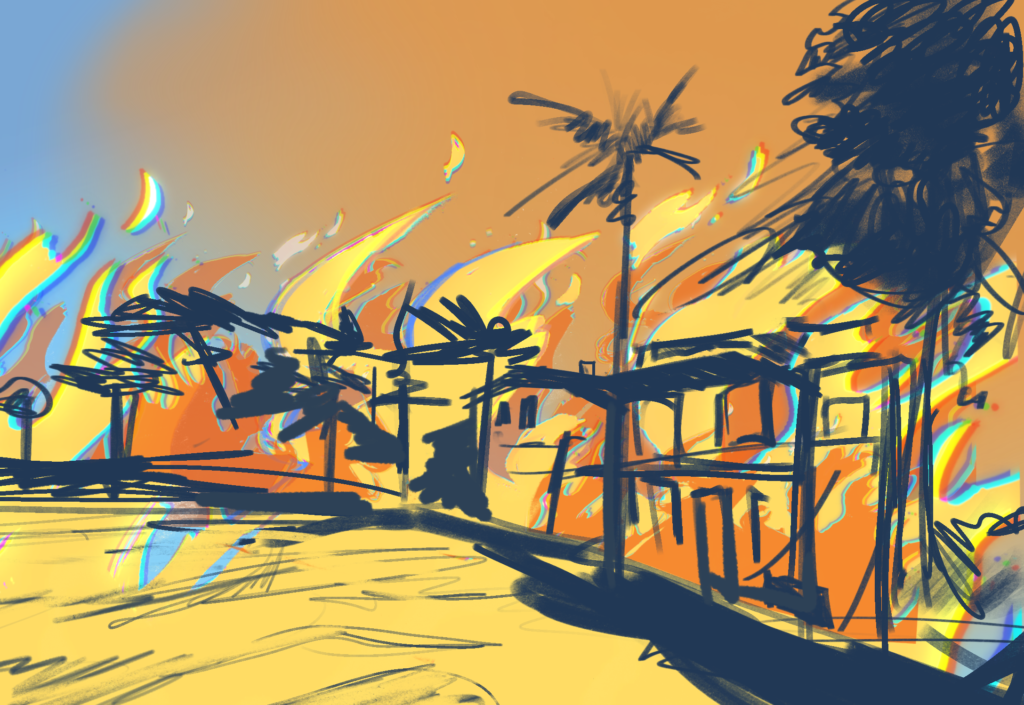On Aug. 8, a series of fires rapidly spread through much of the community of Lahaina, Maui, killing more than 100 people, destroying over 2,000 structures — around 1,500 of which were homes — and forcing thousands to evacuate. Much of the coverage following the fire focused on its effects: the residents at risk and how the tourism industry is suffering.
More of the coverage, however, should’ve examined the direct cause of the fire.
On the day of the devastation, strong winds blew down several power lines, which ultimately sparked the first fire. Soon after, the fire reignited and destruction followed.
According to Fortune, bare electrical wire that could spark on contact and leaning poles that could have been prevented with proper maintenance were both possible causes of the devastating fires. And yet, ironically, Hawaiian Electric still blamed Maui County for most of the devastation caused by the reignition of the company-caused fire that afternoon.
Increased media coverage of the actual party at fault, Hawaiian Electric, would force electric companies to acknowledge their mistakes and find ways to make sure similar accidents don’t happen again.
Until federal investigators were sent to Maui, reporters were unaware of the exact cause of the first fire. Even over two weeks after the fire took place, many — including CBS News — still failed to account for downed power lines in their reported cause of the fire.
Currently, a lawsuit has been enacted by Maui County to Hawaiian Electric for failing to respond to warnings foreshadowing the incident and for failing to fortify their power lines in the years prior. These claims are still in the process of being investigated.
Numerous news outlets mainly faulted climate change, poor access to roads, droughts, hot weather and strong winds. While these factors contributed to the spreading and exacerbation of the fires, the downing of the power lines that sparked the whole incident would not have started without Hawaiian Electric’s power lines going down.
As a result of the relative lack of coverage on this issue, there was little public pressure asking them to change anything, as opposed to the seemingly boundless public attention showered on climate change and the island’s distance from the rest of the U.S.
This is not the first time power lines have caused devastating damage to citizens and the environment around us. In fact, California was also plagued with extreme forest fires in 2020 that turned Northern California skies red. Faulty power lines also were to blame for fires that caused 19% of the area burned from 2016-2020, including the Tubbs fire, the Bobcat fire, the Dixie fire (California’s second largest wildfire) and the Zogg fire. In each of these fires, many sources also blamed climate change as the cause.
Although a growing population has started recognizing the disastrous effects of climate change on recent natural disasters, comparatively few acknowledge the significant role of utility companies. To lessen humans’ effect on the environment, utility companies should be aware of the devastating nature their equipment can play on the world around us. The public should be putting more pressure on these companies, and governments should keep companies more accountable, as shown by Maui County’s actions. If the power lines and electric companies were monitored more closely, many of these fires could have been avoided.
Why should we linger on the environmental factors if we continue to ignore the other immediate causes that could’ve been prevented? Instead of putting more of the blame on external factors we cannot immediately control, we should focus more on what we can do at the moment and try to improve those aspects.
On the part of the electric companies, one solution to this problem could be undergrounding power lines. While they are more susceptible to insulation deterioration, they are much better protected against weather and other conditions that can impact overhead power lines, thereby reducing the chance of common wildfires to spark from power poles that are prone to causing so much death and devastation.




























